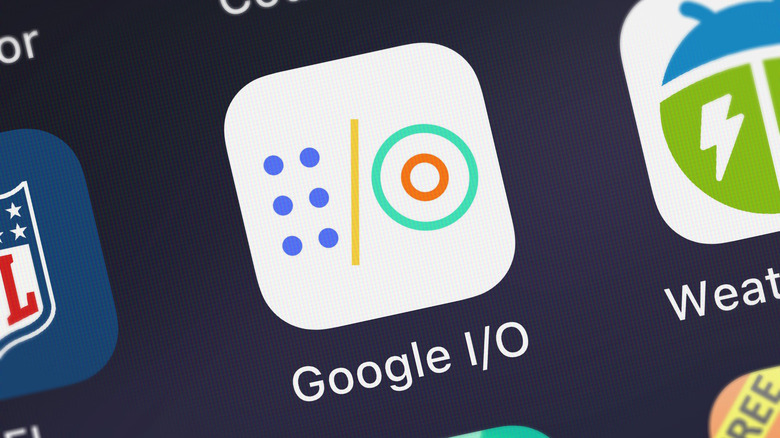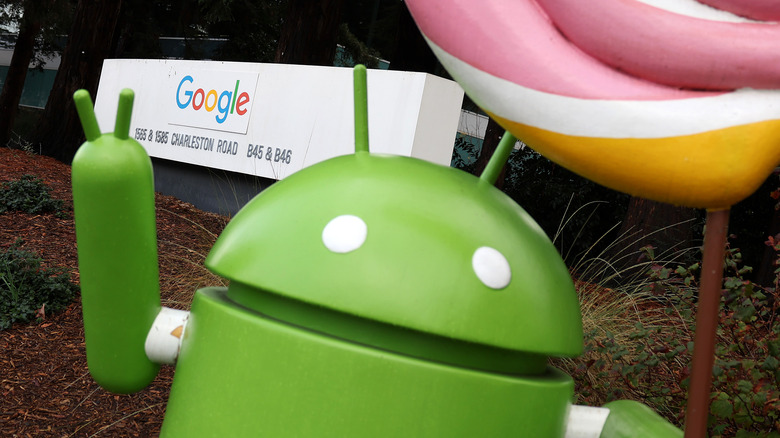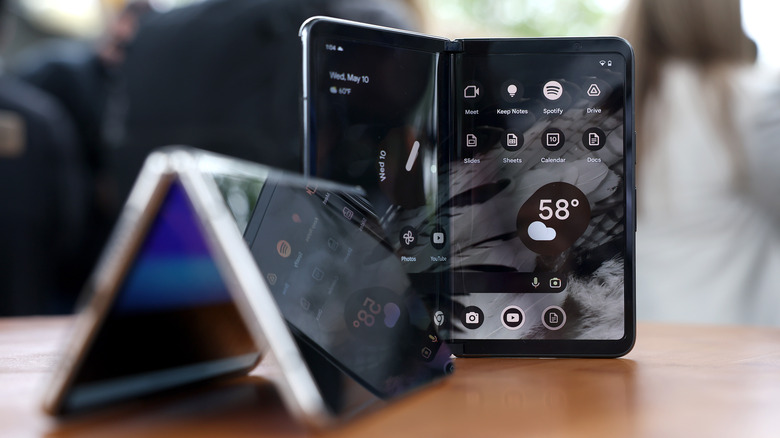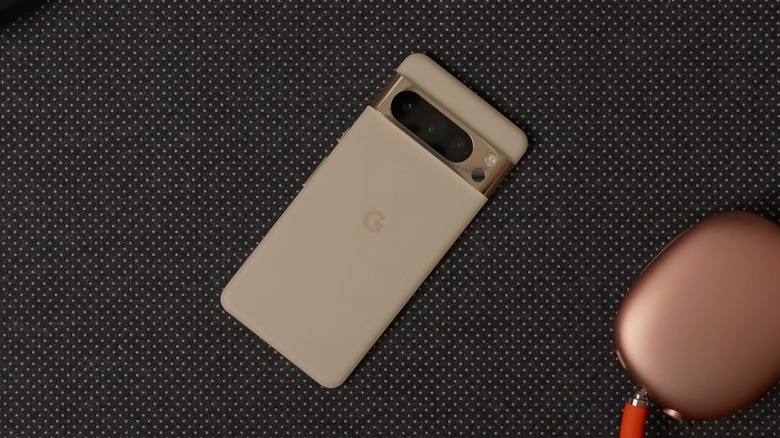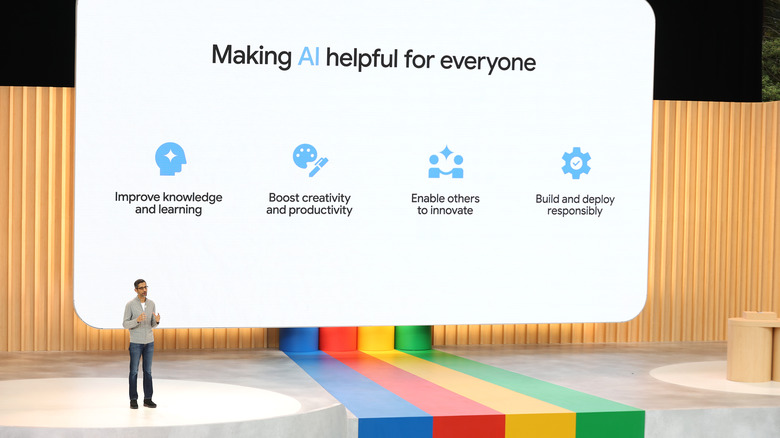From Android 15 To AI, Here's Everything We Expect Google To Unveil At I/O 2024
Google I/O is the company's annual developers' conference, but it's also the stage on which the tech giant is prone to announcing new products. Some of the most exciting moments in Google's history have taken place at I/O, such as the reveal of Google Glass in 2011, or last year's unveiling of the Pixel Fold. Last year, AI was a major focus for the company, and that focus will likely be even more pronounced since generative AI hype has only increased in the past year.
This year, the event is set for May 14, and Google recently published the schedule of keynotes and addresses. It's shaping up to be a fascinating I/O, with the launch of Android 15 on the horizon along with the likelihood of new Pixel or Nest hardware and even major announcements regarding the company's research into AI systems. While we don't have certainty about what Google plans to reveal at this year's I/O, there's plenty of information that suggests those and other possibilities. So, here's what we expect Google to unveil at I/O 2024.
Android 15
The first beta for Android 15 is already out in the wild, so expect even more details about it to be revealed at Google I/O. There's plenty we already know about the next version of the world's most popular mobile operating system, like that it might have a DeX-like desktop mode, an app archiving system to make it easier to load apps on and off a device, changes to key management for end-to-end encryption, and a lot more tuning under the hood. But it's quite likely that Google has been waiting for I/O to reveal the really juicy upgrades, and the official schedule for the event seems to add credence to that theory. A "What's new in Android" panel is scheduled for just after the main and developer keynotes.
Other features we already know about include partial screen sharing—that is, the ability to screen record or cast an app rather than the entire screen—a welcome change for those who don't want private notifications popping up while trying to show off vacation photos on the living room TV. We're also seeing satellite network connectivity that won't be limited to emergencies like it is on the newest iPhones, as well as more notification management to keep annoying group chats at bay, and even improvements to the foldable experience. Speaking of foldables, there's some hardware we hope to see as well, so let's turn our attention to the Pixel lineup.
Pixel Fold 2 and maybe a tablet
Last year's I/O brought us Google's first-ever foldable phone, the Pixel Fold, so it would make sense for the sequel to debut at this year's event. The original Pixel Fold received overall positive but somewhat mixed reviews, drawing praise for its unique design and flack for its enormous bezels and slightly undercooked software. But what's clear is that Google essentially got the fundamentals right, so it's surely looking to iterate on the aspects of the device that were well received. Foldables are quickly expanding as a market segment, with phones like the OnePlus Open being well-reviewed, so the pressure is on Google to deliver something worthy of beating the competition when it comes to the Fold 2, or at least something that will entice more Android developers to optimize their apps for foldable form factors.
Google also released a Pixel Tablet alongside the Pixel Fold. Google has shown interest in pushing the Android tablet market forward several times in the past, only to lose that focus each time. The Nexus 7 and Nexus 10 were released in 2012 to much fanfare, and the 7 was popular enough to get a refresh in 2013. Further attempts were made with the oft-forgotten Nexus 9 and Pixel C in 2014-15. After another lull, 2018 brought with it the befuddling Pixel Slate, a tablet that ran ChromeOS rather than Android and felt more like a response to Microsoft Surface RT devices. There was more silence until last year's Pixel Tablet, which ended up being a blend of Google Home hub and midrange tablet. It wasn't made to be a top-tier tablet, though, which miffed some Google fans who wanted a pairing of powerful tablet specs and Pixel-exclusive software.
The affordable Pixel 8a
Google has historically refreshed its phone lineup halfway through a Pixel cycle with a cheaper midrange model, and there's a good chance we'll see the Pixel 8a shown off at I/O in mid-May. To figure out what we should expect from the new phone in terms of specs, we can look both at the rumors and alleged leaks of the 8a, as well as examine what Google has done with its 'a' phones in the past.
Leaks from enthusiast site Android Headlines suggest that the Pixel 8a will arrive with seven years of security updates to match the same promise Google gave to the regular 8 and 8 Pro. It is also alleged that the 8a will have a slew of AI camera features, including those introduced in the 8 series, including Best Take (which swaps faces from multiple frames), Audio Magic Eraser (which removes background noise from videos), and more. It's also expected to ship with features like Circle to Search, Call Assist, and AI summaries of emails thanks to Google Gemini's deeper integration as a phone assistant.
The 8a is expected to retain the camera visor aesthetic of its bigger siblings, which has often been compared to the headgear worn by Geordi La Forge in "Star Trek: The Next Generation." However, its housing will probably be made from plastic rather than glass. Expect to see a 90Hz OLED display, just like last year's Pixel 7a, with an optical under-display fingerprint sensor. Google likes to reuse cameras for multiple years, so a 64 MP main shooter is likely. However, the newer Tensor G3 chip will probably be the platform it all runs on.
AI, ee-I/O
If there's one thing you should expect Google to talk your ear off about at this upcoming I/O, it's artificial intelligence. The AI race is in full swing, with every major tech company vying for a lion's share of this emerging market. But while some companies are playing catch-up, Google has been a leader in the field for many years, and it's not about to cede ground now. The published schedule for I/O 2024 is chock full of presentations including, "Generative AI on mobile and web with Google AI Edge," which purports to teach attendees how to build AI applications for mobile, and "The Gemini API: From prototype to launch," which looks to show those in attendance how to build apps that tap into its flagship multimodal AI. In fact, running a search for "AI" on the schedule page with Ctrl+F reveals a whopping 85 results. If you want to play a lethal drinking game, take a sip every time the term is mentioned on the I/O stage.
In mid-April, Google and Alphabet CEO Sundar Pichai announced that Google was unifying its hardware team with its platforms and ecosystems team, creating a new team called Platforms and Devices. Pichai wrote that the new division will "accelerate the adoption of the latest Android and AI features." In other words, Google wants to be the first company to fully integrate its AI into its hardware. That Pichai made this announcement just ahead of I/O suggests that some interesting AI-powered hardware could make an early appearance. Just as long as Nest thermostats don't turn into HAL, that sounds exciting.
